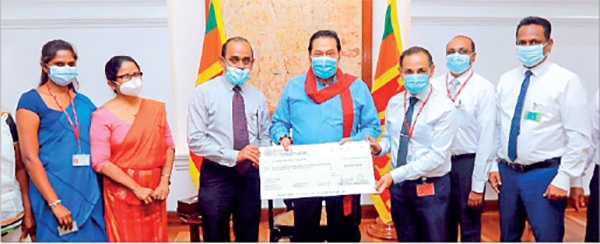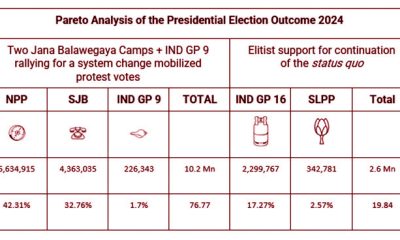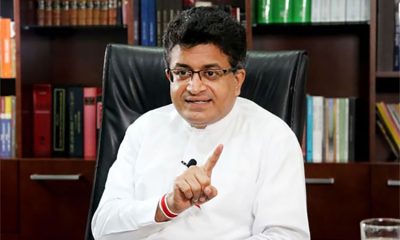Business
PB-ETF schol award project

For the 10th consecutive year, People’s Bank joined hands with the Employees’ Trust Fund (ETF) to reward the children of ETF members who had excelled in the Grade 5 scholarship examination.
ETF chairman Sriyan de Silva Wijeyeratne presented the cheque for this purpose to Prime Minister Mahinda Rajapaksa and People’s Bank chairman Sujeewa Rajapakse at an official event held at Temple Trees recently.
ETF General Manager Primal Fernando and Additional General Manager N.W. Wimalaweera, People’s Bank Deputy General Manager – Process Management, Quality Assurance & Retail Banking Renuka Jayasinghe, ETF Deputy General Manager (Social Services) S.M. Seneviratne, ETF Scholarship Officer W.L.D. Krishanthi, Assistant Officer P.G. Sriyalatha, Management Assistants Sahan Ranaweera and Anastina Devapriya were also present at the ceremony.
Business
SL can penetrate Global Value Chain by offering relative cost advantage: economist

Fragmentation trade is expanding more rapidly than conventional final-good trade
By Sanath Nanayakkare
The notion that Sri Lanka has missed the bus in gaining a firm foothold on the global manufacturing value chain is not true because there are still so many opportunities for the country to tap and increase its export-driven economic growth, Prof. Prema-chandra Athukorala said while speaking at a public lecture at the Central Bank of Sri Lanka on Oct.24, 2024.
“That’s an old-fashioned idea because if Sri Lankan manufacturers can offer a relative cost advantage on their components, parts or accessories manufactured in Sri Lanka to go into a finished product of an iconic global brand, there is still ample opportunity to do so,” he said.
“The relative cost advantage we can offer to these final product manufacturers is crucial though,” he said.
When asked about the product quality, he said,” Sri Lankan suppliers can match with the global standards of manufacturing quality as these are benchmarked and local manufacturers can integrate those standards into their processes without any difficulty.”
” It is found that, while trade in parts and components has generally grown faster than total world manufacturing trade, the degree of dependence of East Asia on this new form of international specialization is proportionately larger than in North America and Europe. International production fragmentation has certainly played a pivotal role in the continuing dynamism of the East Asian economies and increasing intra-regional economic interdependence. There is, however, no evidence to suggest that this new form of international exchange has contributed to reducing the region’s dependence on the global economy. On the contrary, growth dynamism based on vertical specialization depends inexorably on extra-regional trade in final goods, and this dependence has in fact increased over the years,” he said.
“There is clear evidence that fragmentation trade is expanding more rapidly than conventional final-good trade. The degree of dependence on this new form of international specialization is proportionately larger in East Asia than in North America and Europe. This seems to be the result of the relatively more favorable policy setting for international production, agglomeration benefits arising from early entry into this new form of specialization, and considerable inter-country wage differentials,” he noted.
“In such a context, opportunities are open for Sri Lankan manufacturers to integrate with the global value chain with their specialisations in the production of final goods, thus adding value to their own companies and enabling Sri Lanka to increase its GDP,” he noted.
Business
ADB to help improve power supply in West Bengal, India

The Asian Development Bank (ADB) has approved a $241.3 million loan to improve the distribution of power supply in West Bengal, India, which will help enhance people’s quality of life by ensuring they have access to reliable, quality, and sustainable power supply.
“This ADB program is aligned with the government’s Revamped Distribution Sector Scheme, which aims to strengthen the operational efficiency of power distribution companies,” said ADB Principal Energy Specialist Roka Sanda. “Reliable and sustainable electricity distribution and service is essential to West Bengal’s growth and development.”
The West Bengal Distribution System Strengthening Program will improve electricity distribution for 8.96 million consumers in seven districts in West Bengal. The program will replace low-tension overhead lines with aerial bundled cables, separate electricity feeders for agriculture and non-agriculture users, and develop an integrated information and operation management system for power supply quality, performance monitoring, and corporate financial management.
The program will raise the operational efficiency of the West Bengal State Electricity Distribution Company Limited by building its capacity on asset and financial management, promotion and introduction of renewable energy, tariff rationalization, and on gender equity and social inclusion.
ADB will help update relevant safety policies and manuals, while supplying health and safety equipment such as first aid kits and personal protective equipment. The program will contribute to awareness-building in communities, particularly on electrical safety, and train district technical and engineering staff on behavioral safety.
ADB is committed to achieving a prosperous, inclusive, resilient, and sustainable Asia and the Pacific, while sustaining its efforts to eradicate extreme poverty. Established in 1966, it is owned by 69 members—49 from the region.
Business
NDB Bank’s sustainable bond framework receives ‘Good’ rating from Sustainable Fitch

National Development Bank PLC (NDB) has received a Second-Party Opinion (SPO) from Sustainable Fitch for its Sustainable Bond Framework (SBF), marking a significant step in NDB’s commitment to sustainable finance. The SPO, which provides an independent assessment of NDB’s framework, has rated the alignment of the bank’s sustainability bond framework as “Good” based on internationally recognised principles and guidelines set forth by the International Capital Market Association (ICMA).
The Sustainable Bond Framework enables NDB to finance or refinance projects under several green and social categories that support Sri Lanka’s national goals for environmental protection and social advancement. These include seven green use of proceeds (UoP) categories such as renewable energy, green buildings, clean transportation, and climate change adaptation, as well as four social categories, including affordable infrastructure and employment generation. Sustainable Fitch’s validation confirms that NDB’s approach to sustainability bonds aligns with key principles and guidelines of ICMA.
-

 Opinion6 days ago
Opinion6 days agoA Pareto analysis of ‘Jana Balawegaya’ force
-

 Editorial3 days ago
Editorial3 days agoProbe reports, skewed logic and emerging threats
-

 Editorial7 days ago
Editorial7 days agoWere the right questions asked?
-

 Foreign News4 days ago
Foreign News4 days agoLee Hsien Yang, youngest son of Singapore founder, claims asylum in the UK
-

 News2 days ago
News2 days agoGammanpila challenges Minister Herath over allegations against former judge
-

 Sports2 days ago
Sports2 days agoSri Lanka riding high on an impressive run
-

 Features7 days ago
Features7 days agoKumar David: An Accomplished Academic and a Broadminded Marxist
-

 Features6 days ago
Features6 days agoRelevance of a neutral foreign policy











